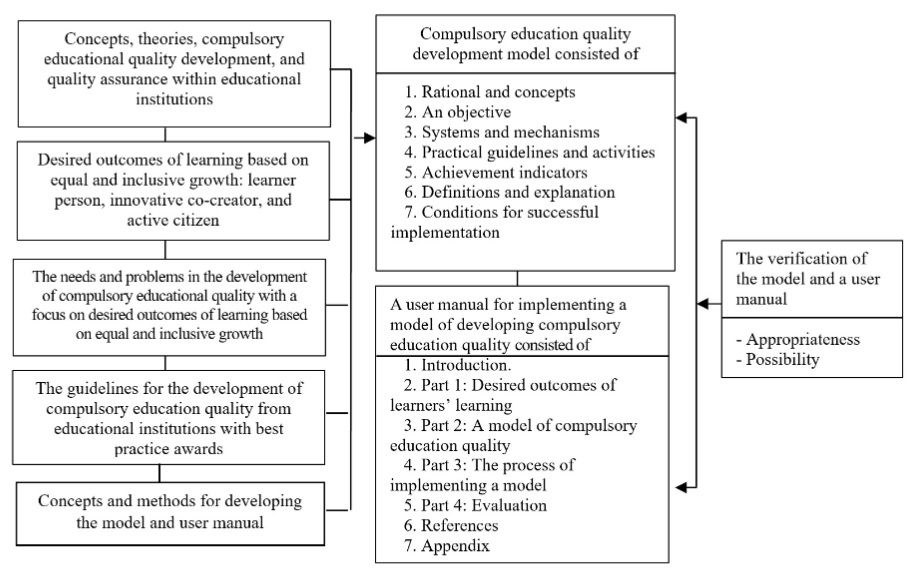Compulsory education quality development model focused on the desired outcomes of learning based on equal and inclusive growth
Main Article Content
Abstract
The purposes of this study were 1) to investigate the concept of compulsory educational quality focused on desired outcomes of growth-based learning in an equitable and inclusive manner, 2) to examine the needs, problems, and guidelines for the development of compulsory educational quality, 3) to develop a model of compulsory educational quality, and 4) to verify the model and a manual. Key informants consisted of 37 experts and 364 administrators. The instruments used were 1) a conceptual synthesis table 2) a focus group discussion, and 4) a verifying form. The percentage, frequency, mean, and standard deviation were statistically used to analyze data. The results were summarized as follows: 1. The concepts of compulsory educational quality were divided into 2 levels: 1.1) primary level consisted of 5 major concepts with 17 minor concepts, and 70 indicators, 1.2) lower secondary level consisted of 5 major concepts with 23 minor concepts, and 100 indicators, and the confirmation results were overall at the highest level and passed the determined criteria at 3.51 or higher. 2. The needs, problems, and guidelines for the development of compulsory educational quality overall were at a high level in every area. 3. A model for developing compulsory educational quality focused on desired outcomes of learning based on equal and inclusive growth consisting of 7 components was named “DOLEIG-EQD” Model. 4. The verifying results of precision, appropriateness, possibility, and utility of the model and a manual for developing compulsory educational quality were overall at the highest level and passed the determined criteria at 3.51 or higher.
Article Details

This work is licensed under a Creative Commons Attribution-NonCommercial-NoDerivatives 4.0 International License.
References
[ 1] The World Bank Group, Wanted – A Quality Education for All in Thailand. Available from: https://www.worldbank.org/en/country/thailand/publication/wanted-a-quality-education-for-all-in-thailand (accessed 20 December 2022)
[ 2] Office of the National Education Commission, National Education Act B.E. 2542 (1999) and Amendments (Second National Education Act B.E. 2545 (2002). Pimdeekarnpim Co., Ltd. (2003)
[ 3] Bureau of International Cooperation, Ministry of Education, Thailand. 2008. An Introduction to Education in Thailand. Available from: http://www.bic.moe.go.th/images/stories/book/ed-eng-series/intro-ed08.pdf (accessed 20 December 2022)
[ 4] United Nations, The Sustainable Development Goals in Thailand. Available from: https://thailand.un.org/en/sdgs/4 (accessed 20 December 2022)
[ 5] Royal Thai Government Gazette, Ministerial Regulations for Educational Quality Assurance B.E. 2561 (2018). Available from: http://gqa.nsru.ac.th/doc/กฎกระทรวง-การประกันคุณภาพการศึกษา-2561.pdf (accessed 20 December 2022)
[ 6] Office of the Education Council, National Educational Standards B.E. 2561 (2018). Available from: https://fliphtml5.com/wbpvz/yevy/basic (accessed 20 December 2022)
[ 7] UNESCO, Quality and learning indicators. Available from: https://learningportal.iiep.unesco.org/en/issue-briefs/monitor-learning/quality-and-learning-indicators. (accessed 20 December 2022)
[ 8] Organization for Economic Co-operation and Development (OECD), Education at a Glance 2021: OECD Indicators. Available from: https://www.oecd-ilibrary.org/sites/3b6fdba3-en/index.html?itemId=/content/component/3b6fdba3-en (accessed 20 December 2022)
[ 9] Liu, Y., Yao, J., Zhou, S. 2020. Is the Standardization of Compulsory Education School Helpful to Improve Students’ Performance? An Empirical Analysis Based on Monitoring Data in Province. A Best Evid Chin Edu, 5(1):591-608. Doi: 10.15354/bece.20.ar039
[ 10] Phumphongkhochasorn, P., Chotientip, T., Wirat Maneephruek, W., & Nampaponangkul, P. 2021. A model for developing educational quality and standards of secondary schools under the supervision of Bangkok metropolitan administration with the new quality assurance framework. Asia Pacific Journal of Religions and Cultures, 5(1), 87-100.
[ 11] Poungkaew, P., Puthaprasert, C. 2020. A model of work-integrated learning to prepare educational administrators for Thailand. Interdisciplinary Research Review. 15(3). 7–13.:
[ 12] Mitchell. C, 5 Key Components of Model Development, Implementation, and Use. Available from: https://www.bba.org.uk/news/insight/5-key-components-of-model-development-implementation-and-use/#.Xls3WqhLjDc. (Accessed 20 December 2022)
Phonprasert, S., Phruitthikul, P., & Teacha, P. 2022. A Model of Educational Quality Development the Small-Sized Schools in the Lower Northern Region, Romphruek Journal, Krirk University, 40(2), 49-68. https://so05.tci-thaijo.org/index.php/romphruekj/article/view/255827/174797


